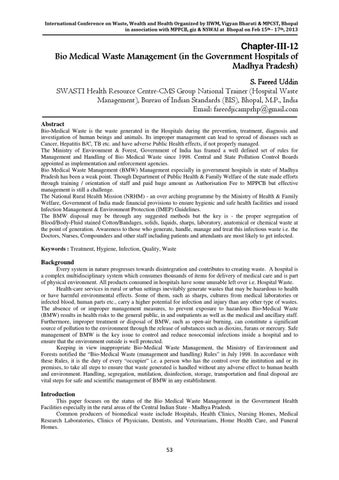International Conference on Waste, Wealth and Health Organized by IIWM, Vigyan Bharati & MPCST, Bhopal in association with MPPCB, giz & NSWAI at Bhopal on Feb 15th - 17th, 2013
Chapter-III-12 Bio Medical Waste Management (in the Government Hospitals of Madhya Pradesh) S. Fareed Uddin SWASTI Health Resource Centre-CMS Group National Trainer (Hospital Waste Management), Bureau of Indian Standards (BIS), Bhopal, M.P., India Email: fareedjicamprhp@gmail.com Abstract Bio-Medical Waste is the waste generated in the Hospitals during the prevention, treatment, diagnosis and investigation of human beings and animals. Its improper management can lead to spread of diseases such as Cancer, Hepatitis B/C, TB etc. and have adverse Public Health effects, if not properly managed. The Ministry of Environment & Forest, Government of India has framed a well defined set of rules for Management and Handling of Bio Medical Waste since 1998. Central and State Pollution Control Boards appointed as implementation and enforcement agencies. Bio Medical Waste Management (BMW) Management especially in government hospitals in state of Madhya Pradesh has been a weak point. Though Department of Public Health & Family Welfare of the state made efforts through training / orientation of staff and paid huge amount as Authorisation Fee to MPPCB but effective management is still a challenge. The National Rural Health Mission (NRHM) - an over arching programme by the Ministry of Health & Family Welfare, Government of India made financial provisions to ensure hygienic and safe health facilities and issued Infection Management & Environment Protection (IMEP) Guidelines. The BMW disposal may be through any suggested methods but the key is - the proper segregation of Blood/Body-Fluid stained Cotton/Bandages, solids, liquids, sharps, laboratory, anatomical or chemical waste at the point of generation. Awareness to those who generate, handle, manage and treat this infectious waste i.e. the Doctors, Nurses, Compounders and other staff including patients and attendants are most likely to get infected. Keywords : Treatment, Hygiene, Infection, Quality, Waste
Background Every system in nature progresses towards disintegration and contributes to creating waste. A hospital is a complex multidisciplinary system which consumes thousands of items for delivery of medical care and is part of physical environment. All products consumed in hospitals have some unusable left over i.e. Hospital Waste. Health-care services in rural or urban settings inevitably generate wastes that may be hazardous to health or have harmful environmental effects. Some of them, such as sharps, cultures from medical laboratories or infected blood, human parts etc., carry a higher potential for infection and injury than any other type of wastes. The absence of or improper management measures, to prevent exposure to hazardous Bio-Medical Waste (BMW) results in health risks to the general public, in and outpatients as well as the medical and ancillary staff. Furthermore, improper treatment or disposal of BMW, such as open-air burning, can constitute a significant source of pollution to the environment through the release of substances such as dioxins, furans or mercury. Safe management of BMW is the key issue to control and reduce nosocomial infections inside a hospital and to ensure that the environment outside is well protected. Keeping in view inappropriate Bio-Medical Waste Management, the Ministry of Environment and Forests notified the “Bio-Medical Waste (management and handling) Rules” in July 1998. In accordance with these Rules, it is the duty of every “occupier” i.e. a person who has the control over the institution and or its premises, to take all steps to ensure that waste generated is handled without any adverse effect to human health and environment. Handling, segregation, mutilation, disinfection, storage, transportation and final disposal are vital steps for safe and scientific management of BMW in any establishment.
Introduction This paper focuses on the status of the Bio Medical Waste Management in the Government Health Facilities especially in the rural areas of the Central Indian State - Madhya Pradesh. Common producers of biomedical waste include Hospitals, Health Clinics, Nursing Homes, Medical Research Laboratories, Clinics of Physicians, Dentists, and Veterinarians, Home Health Care, and Funeral Homes.
53
